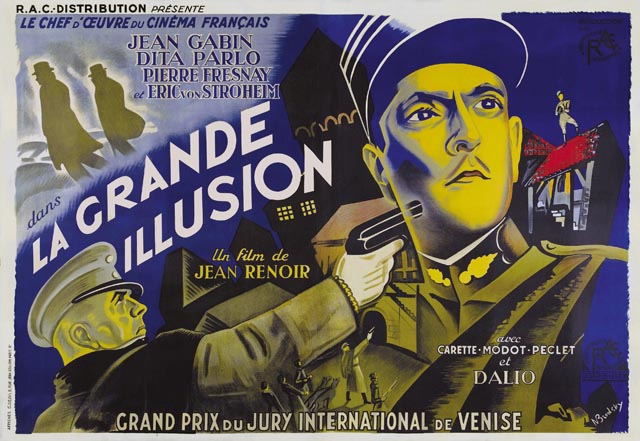Today, New York sees the Stateside premiere of the 75th Anniversary Restoration of Jean Renoir’s Grand Illusion. Following a two-week run at Film Forum, Rialto Pictures will be taking this new 35mm print to Los Angeles, San Francisco, Dallas, Austin, Chicago and beyond. Here‘s the schedule.
“Grand Illusion had its premiere at the Venice Film Festival in 1937, and it has been around ever since, by enduring consensus one of the greatest films ever made,” begins A.O. Scott in the New York Times. “Franklin D. Roosevelt declared that ‘all the democracies in the world must see this film,’ which is still sound advice. The nations that fall within that rubric may have grown in number since those days, but none of those democracies, old or new, is so secure as to be immune to the lessons of Jean Renoir’s great and piercing antiwar comedy. Which is not to say that Grand Illusion is didactic, though it is, like much of the art of its era, unapologetic about its social concerns and political implications. It survives partly as a document of those volatile times, and of the idealism that persisted through them even as history prepared a new, unimaginable round of horrors. Seventy-five years on, Europe is far from a state of war, but in light of its current crisis—which is not only economic and political, but also, once again, a crisis of identity—Renoir’s film is still news.”
“From parallel opening scenes that introduce French officers Boeldieu (Pierre Fresnay) and Maréchal (Jean Gabin) and German aviator von Rauffenstein (Erich von Stroheim) in their respective HQs, where the French and German watering holes even resemble each other, Grand Illusion takes pains to highlight the cultural and social bonds that unite these men, as well as the nationalistic and militaristic barriers that divide their nations.” Budd Wilkins for Slant: “Underneath the brittle surface of Renoir’s much vaunted ‘humanism’ (never for a moment should it be mistaken for laissez-faire moralism), there lay a vast reservoir of indignation that had been brought to a fever pitch by the certainty that history was about to repeat itself as Europe fell under the shadow of totalitarianism. Renoir, though, was never one for tractates. Son to his famous painter father, Renoir sublimated this riot of roiling emotions into the precision of his compositions, which helps to explain the recurrence of a kind of paradigmatic shot that frequently punctuates Grand Illusion: a character (or group of characters) stands before a window. The camera traps them within the window frame like specimens beneath a bell jar, then moves beyond them to limn the open spaces just outside their reach, rendering palpable their yearning to escape from a certainly hopeless situation into one still hopefully uncertain. Thus the haunting final shot that tracks Gabin and Marcel Dalio, forging their way across wintry wastes toward the sanctuary of Swiss neutrality, remains one of the most elusively open-ended in all of film history.”
“Grand Illusion‘s open ending gives cause for hope, but Renoir’s prayer for peace was unanswered. Renoir and Gabin decamped to Hollywood, though the latter eventually served as a tank commander with de Gaulle’s Free French in North Africa,” notes Nick Pinkerton in the Voice. “Grand Illusion‘s path through the war was no easier. Surviving in various censored and scissored international versions, the definitive Illusion was thought to have been destroyed, either by the Germans—Joseph Goebbels famously declared the film ‘Cinematographic Enemy no.1’—or in Allied bombing. While Renoir re-assembled his cut from available odds-and-ends for a 1958 re-release, unbeknownst to all interested parties, the original camera negative of Grand Illusion persevered, stowed away in Moscow. The triumphant Red Army had taken it from the Reichsfilmarchiv in Berlin—where it was itself a P.O.W.—to Russia; in the ’70s, Moscow returned the displaced print to the Cinémathèque de Toulouse in a pile of unmarked, un-inventoried boxes, where it was discovered some 20 years later, gathering dust…. [T]he essential spirit of Renoir’s film has never dimmed through decades of being projected on bedsheets for college film societies or viewed on deteriorating VHS. Opposing the tectonic grinding of political movements with simple humanity, Grand Illusion‘s heroic eminence is the nearest thing cinema has to a lone Tiananmen Tank Man.”
For news and tips throughout the day every day, follow @KeyframeDaily on Twitter and/or the RSS feed.




